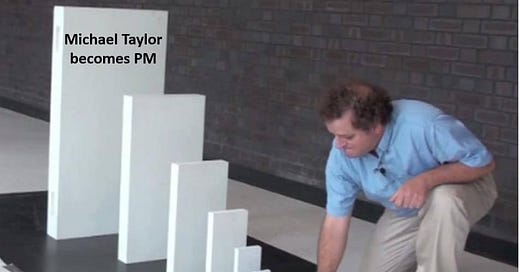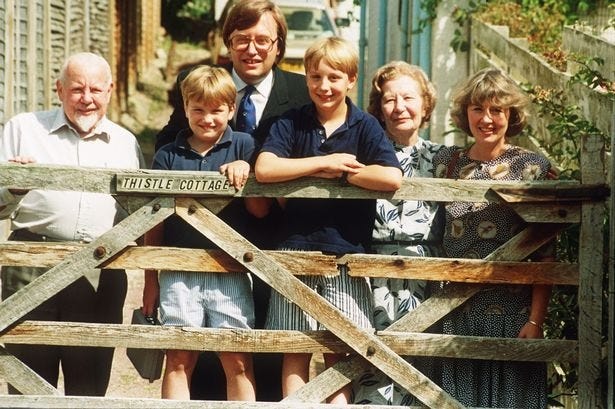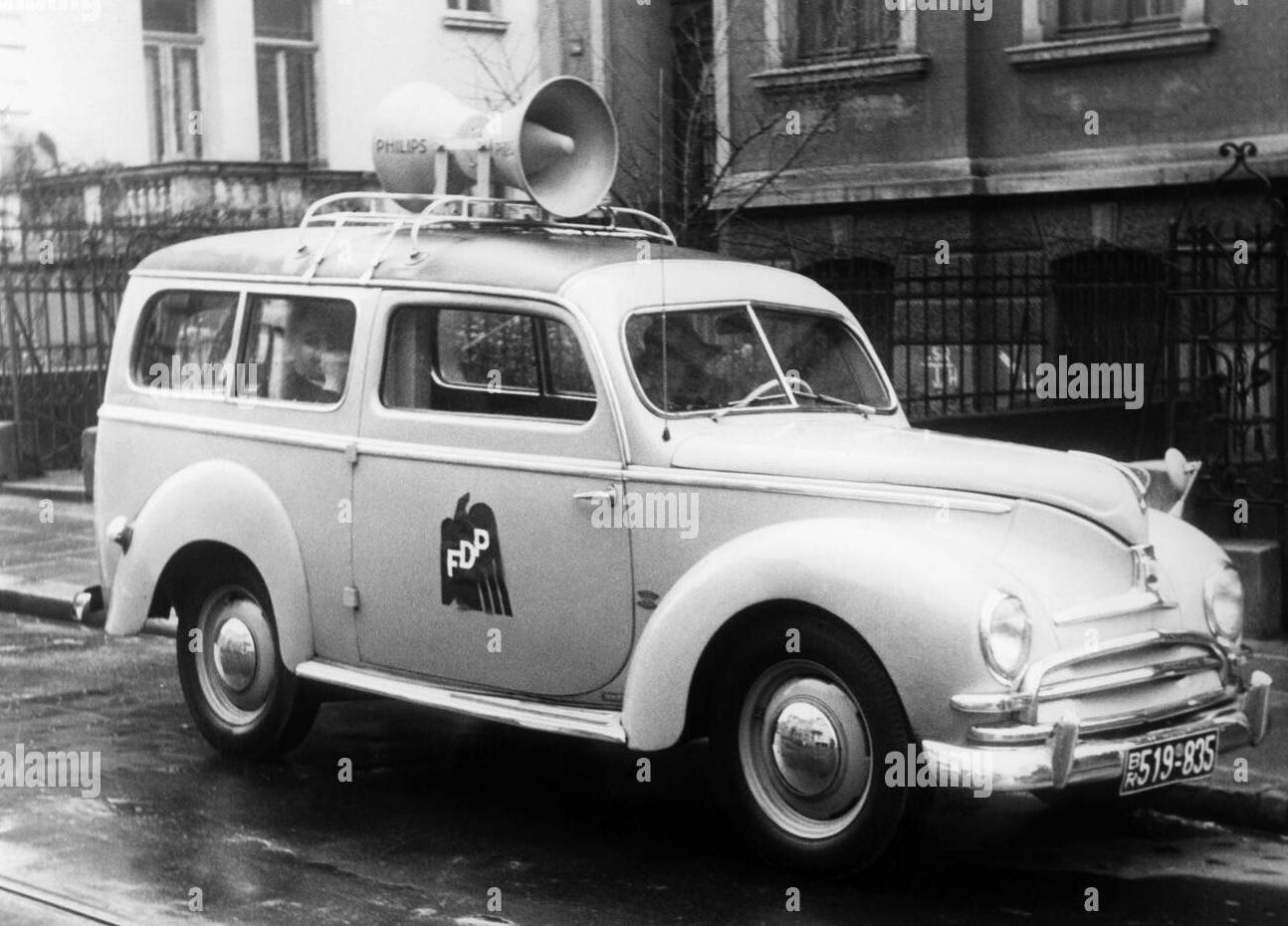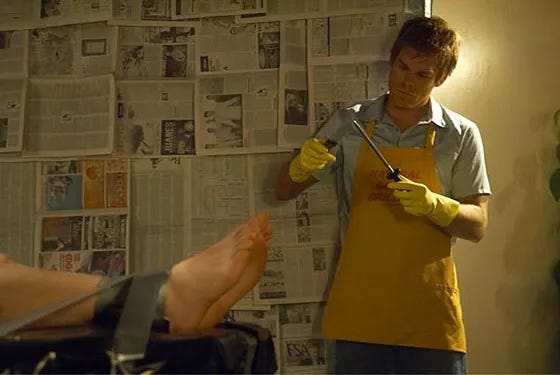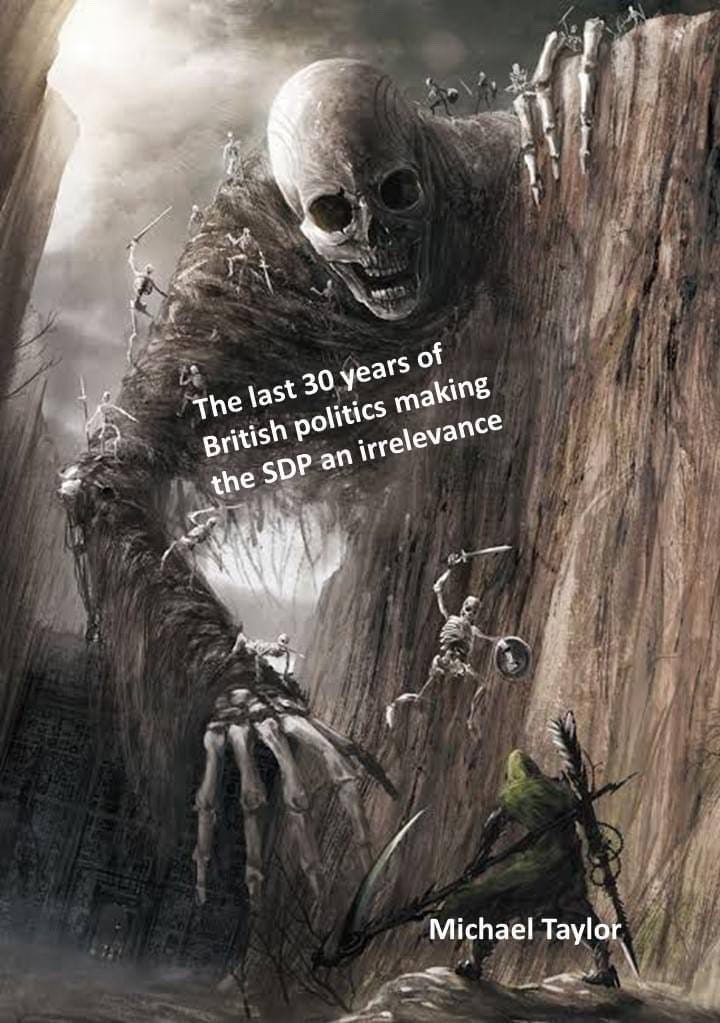I can be pig-headed. The question was: who could I possibly vote for in the 2019 General Election. I’d been a member of the SDP for about 18 months and these were my choices:
The Conservative would win, of that I was certain. In this constituency, the Conservative candidate could illustrate his election literature with how to joint and barbeque your labrador puppy, and still be sure of his seat.
The LibDems had pursued their campaign against democracy with feverish diligence, whilst at the same time competing for the votes of Britain’s most belligerently divisive identitarians.
The Labour party was enthusiastically campaigning to put into Number 10 a man so lost to reason and self-awareness he couldn’t even recognize his own sustained anti-Semitism.
And the Greens were essentially a badge saying: ‘I’m middle class and mad.’
So it was that very late in the day, the historic 2019 entry of Michael Taylor into the electoral politics of Britain was decided. I became the SDP’s candidate.
My wife’s immediate response was: ‘If there’s any monkey-business, I won’t be standing by you. No ‘five-bar gate strategy’ for you.’
The more general reaction of my friends was: ‘Gosh, that’s brave’. Eh? I hadn’t the slightest intention of being brave. What could they mean? But wait, they could be right. I mean, everyone hates politicians. Heck, I’m only in this race because they’re so dreadful. And although the constituency was in North Yorkshire, there had been that time the wife of my friend got shouted at in the street because of the stand he’d taken over a proposed new supermarket. Had I inadvertently been brave?
(Spoiler alert: no.)
I had, however, embarked on a tough few weeks of campaigning which taught me stuff I didn’t know about myself and about electoral politics.
Everyone was better prepared than me, having been round the traps before. They knew the deadline for getting their manifesto message into the local press. Hell, they knew what the manifesto message had to be, and decent photos to hand. A friend who had campaigned as an independent for the local council looked me squarely in the eye and said: ‘Make sure you’re with your dogs in the photos. It’ll double your vote’. I have two dogs, very photogenic, but in the rush they didn’t make it on to the campaign literature. Votes down the drain.
It rapidly became clear that without major party support, without experience, without time, without a campaign staff, without money, standing as the SDP candidate was an exercise in retail vs wholesale politics. Sole trader vs Tesco.
The major parties (even the Greens) knew what they were doing. They greedily scooped up the new electoral rolls distributed by the returning officer. Presumably they had the knowledge, experience, and technology to use them to good purpose. They knew where they could place posters. Their candidates had support teams who could, I assume, give them comfort and tea when the impossible fight was getting tough.
I had me, me and me, a job to work around and less than three weeks to the winning post. By the time my dogless campaign literature arrived from head office, less than that. As luck would have it, I was also campaigning in one of geographically largest constituencies in the country. Doing is retail was impossible even just from a transport point of view: I’d have to narrow my efforts down to just my local town. Two thirds of the electorate would struggle to hear my message.
So in the mid-afternoon of a mid-winter, the sun already ducking out of the unequal fight, I set to work. I’d already been warned against daring to show my face in the local ‘tough’ ex-council estate where ‘people nail their letter-boxes shut.’ But it was close, and we’d already established just how brave I was being and so . . . .
First time out, I learned a couple of important things. Most letter-boxes are spring-loaded finger-traps. If you want to push campaign literature through hundreds of these, you need to wear some finger-guards made out of cardboard and gaffer-tape. Looks weird, but perhaps less so than approaching a potential voter with, literally, blood dripping from your hands.
My initial approach was cowardly - I’d deliver the literature and head quickly off next door, with no attempt to actually talk to anyone. Yet the people who did catch me at it, on this ‘tough’ estate, were at first surprised, and then mostly pleased, that I’d bothered to come round. They hadn’t seen an election candidate in decades, I was told repeatedly. I also found that this was no ‘tough estate’ - it was just full of people making their way through their lives in a multitude of ways, and around or under a number of problems.
I felt smaller for it, but also I felt moved by it.
This is strange: one of the least-expected legacies of my tilt at parliament was a heightened appreciation of, love for, my electorate. Such a pity it wasn’t reciprocated.
Next off, one of the most important constituencies: our local tip. This is not a joke: in my town, the tip, or ‘recycling centre’ is a source of genuine and proper pride, and its staff are on familiar terms with everyone. So it’s definitely worth spending half an hour sharing a cup of tea with them and expounding the SDP philosophy. As I ought to have guessed, this was the most educated audience I’d have, with at least one ‘operative’ the possessor of not one, but two, degrees.
All too soon, it was hustings time. This short campaign included four hustings, and it is fair to say that in three of them I did badly. In two of them, very badly. This was mainly because as a medium of discussion or even exposition, they are hopeless - if you can get your message across in less than two minutes, you don’t need to.
Well, I tried, but in the first hustings, held one dark night in a dark church, I came unstuck very badly. Not because I tried to shout-down the chairman (that was hustings #3), but because the audience basically thought I was a pompous jerk. After the hustings were over, the candidates mingle in a friendly way with their potential voters. As I stood there, in my best tweed jacket and tie, an elderly North Yorkshire farmer and his wife tapped me on the shoulder: ‘I thought you’d like to know, we thought you were the least-attractive candidate’.
It’s a true story, it happened.
Help was at hand: the SDP leader William Clouston made the wonderful effort to spend a day campaigning with me. He arrived, full of good cheer, in a ‘speaker-car’. These have fallen out of fashion almost completely, but essentially, the car is topped by a giant hailer, through which loops the following important message at high volume: ‘Vote for Michael Taylor, your SDP candidate. Vote SDP.’ And so we drove, very slowly, around the town, blaring out this message. Like some fiendish soft-torture technique, lengthy exposure to this message first makes you sleepy, then slightly hysterical, after which it is best to stop.
William also shook me out of my cowardice: no posting the literature and running away for him, he taught me the basics of how to introduce yourself as a candidate on the doorstep. I should have conquered this basic reluctance right from the start, because not only was it infinitely more effective, it was also . . . fun. And on occasion, bizarre, like when a man came to the door clothed in large rubber gloves, plastic ‘pathologists’ apron, and protective eye-mask. ‘It’s not just convenient at the moment. . . ‘
What, you may be asking, was the toll on my family? Well, I have two daughters, and one way or another, this meant my doomed quest got turned into memes:
and this. . .
The last hustings was at our local school, in front of the whole six form. This was, by some margin, the smartest and most engaged audience we’d competed for. The breakthrough realization came when the Labour candidate’s familiar list of freebies was met not by enthusiasm, or questions, but just by out-loud laughter. I got on well with the sixth form. Maybe they’d seen the memes.
And all too soon, it was over - candidates to meet at local sports-hall for the count, starting 5am. I spent time thanking the counters, and thanking them sincerely. I know now that electoral politics is an expensive business which relies above all on the freely-given goodwill and generosity of all involved - candidates, officials and the electorate. Never again will I listen complacently to those scoffing at it: it is above all a benign and cooperative process, of which we can, and should, be proud.
In the end, I did no better and no worse than the average of 2019’s 20 SDP candidates. On balance, I think I was a bad candidate. Not because I am particularly voter-repellent, but because I didn’t know what I was doing, and I was up against people who really did. Experience matters a lot in this business. But so does organization, party recognition, money.
But above all, it has changed my relationship to my country. It’s hard to put a finger on it, to express it. Let me just say this: after the vote was announced, my main feeling was that I had let down those people who had voted for me. I’d met these people, I knew that they needed something like the SDP could be, and now I’d be out of their lives.
People need help and support, and at the most basic level, they need someone to listen to them, to share their concerns and worries. In short, they could do with someone to stand up with and for them. So if you ever get that pig-headed moment is disgust, forget your cowardice, forget your inadequacy, forget even the defeat you can feel heading your way. Take good photos of you with your dog, fashion yourself some finger-guards, take a deep breath and a good look at your neighbours, and go for it. They’re worth it. End of lesson.

